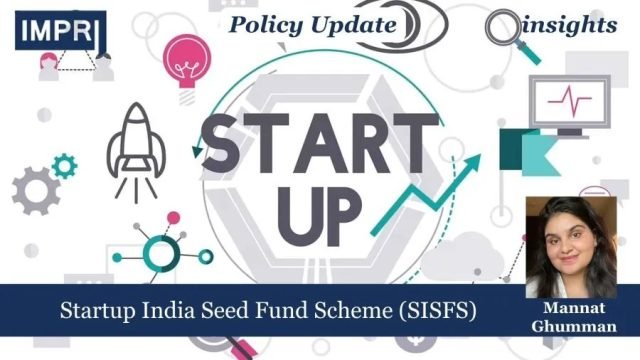Mannat Ghumman
India has experienced an unprecedented boom in startup creation and funding over the
past decade, establishing itself as a key global hub for innovation and business.
Startup India Seed Fund Scheme (SISFS)
India has experienced an unprecedented boom in startup creation and funding over the past decade, establishing itself as a key global hub for innovation and business. The number of tech companies in India has surged to 122,000, with a notable peak in 2020 when over 16,000 new startups were launched. Factors such as increased internet penetration, digitization, and supportive government initiatives have driven the growth of top-funded sectors from 2014 to 2023.
Tech startups are leading the charge in innovation, continually advancing technology and offering disruptive solutions across various industries. This innovative spirit is transforming the economy, fostering new industries, and boosting India’s global competitiveness. Successful startups enhance technology, thereby promoting economic development.
The Economic Survey 2023 highlights that the Indian startup ecosystem has notably created around 1 million jobs by 2023. Indian tech startups are gaining international recognition, attracting substantial foreign investment, and forming global
partnerships. This capital influx is fueling the growth of India’s startup ecosystem, enabling startups to expand their operations, enter new markets, and further drive economic development.
The Government of India’s Startup India Seed Fund Initiative aims to build a robust startup ecosystem that nurtures innovation and provides opportunities for aspiring entrepreneurs. Launched by the Department for Promotion of Industry and Internal Trade (DPIIT) on April 19, 2021, the Startup India Seed Fund Scheme (SISFS) has an outlay of INR 945 Crore to provide financial assistance to startups for proof of concept, prototype development, product trials, market entry, and commercialization.
Early-stage access to capital enhances a startup’s potential to scale, attracting further investment from angel investors, venture capital firms, banks, and other financial institutions.
Objective and Functioning.
Seed funding is the first stage of investment for a business – where the business could conspire of only a product idea and is still in the market validation process. Since the startup is in its early stages and often hasn’t yet proven its merit in the market, this funding generally involves risk on the part of the entity that is funding. Limited funds hinder the creation of a Minimum Viable Product (MVP) for testing and market entry. Startups struggle to gain market traction and earn customer trust without adequate resources for marketing. Founders lack expertise in building teams and formalizing core processes, hindering growth.
The Indian startup ecosystem faces a significant challenge due to a lack of capital at the seed and ‘Proof of Concept’ development stages. The capital required at this critical juncture can determine the success or failure of startups with promising business ideas. Many innovative concepts fail to progress because they lack the essential early-stage funding needed for proof of concept, prototype development, product trials, market entry, and commercialization. Providing Seed Fund to such promising startups can have a
multiplier effect, validating business ideas and leading to substantial employment generation.
Eligible startups can apply for this scheme through the Startup India portal, with funds disbursed through selected incubators nationwide.For the purpose of this scheme, an Incubator is an entity responsible for selecting startups, disbursing seed funds to them, and monitoring their progress. The Incubator will also provide physical infrastructure to the selected startups for their regular operations. This includes support for testing and validating ideas, mentoring for prototype or product development and commercialization, and building capacities in finance, human resources, legal compliances, and other functions.

The Department for Promotion of Industry and Internal Trade (DPIIT) has established an Experts Advisory Committee (EAC) to oversee and implement the Startup India Seed Fund Scheme. The EAC is tasked with selecting eligible incubators to receive grants of up to Rs 5 Crores each. These selected incubators will then support startups, providing up to Rs 20 lakhs for validation of Proof of Concept, prototype development, and product trials.
Furthermore, startups may receive up to Rs 50 lakhs for market entry, commercialization, or scaling efforts through convertible debentures or debt-linked instruments. Comprehensive guidelines for the Startup India Seed Fund Scheme can be found on the
Startup India portal. The support provided to startups in their early stages is expected to generate substantial employment opportunities, benefiting the wider economy.
Evolutionary Cycle of Startups in India
- Simplification and Digital Integration: The Indian government has streamlined the setup process for new enterprises by integrating key registration forms like TAN, PAN, and DIN into a single form called SPICe+. This allows for easy business incorporation online without any fee for startups with capital up to INR 15 Lakh.
- Transparency and Compliance Ease: Projects like Project Insight and the INTRAC enhance data sharing among tax authorities and utilize analytics to improve tax administration. The CMCPC leverages this data to simplify compliance requirements for startups, reducing their burden.
- Regulatory Reforms: Since 2016, 53 regulatory reforms have been implemented to support startups, including extended recognition of businesses as startups for up to 10 years with a turnover limit of INR 100 Cr and tax rebates on profits for 3 out of these 10 years if criteria are met.
- Self-Certification and Intellectual Property Incentives: Startups can self-certify compliance under certain labour and environmental laws for up to 5 years post-incorporation. They also benefit from significant rebates on patent and trademark filing fees, with educational institutions now also eligible for patent fee refunds.
- Ease of Exit: The government has categorized startups as ‘fast track firms’, enabling them to close operations within 90 days compared to the standard 180 days.
- Funding and Support Schemes: Numerous schemes under various ministries provide financial, infrastructural, and technical support. Notable ones include the Startup India Seed Fund Scheme, NIDHI program, and TIDE 2.0, all aiming to foster innovation and assist startups at various stages of their business journey.
- Foreign Investment and Export Promotion: Relaxation in FDI policies and schemes like RoDTEP encourage foreign investment and support startups in global trade, enhancing their export capabilities.
- Venture Capital and Investment Platforms: SIDBI’s Fund of Funds and the Credit Guarantee Scheme for Startups provide substantial financial backing. Startup India Investor Connect platform uses AI to match startups with potential investors.
- Innovation Ecosystem: The Atal Innovation Mission and Startup India Initiative have been pivotal in promoting an innovation-driven environment, supporting thousands of startups through incubation centers and providing a comprehensive online resource portal.
- These initiatives collectively aim to transform India into a vibrant entrepreneurial hub, reducing bureaucratic hurdles and fostering an ecosystem conducive to startup growth and innovation.
Impact of Startups
Agarwal and Ankur (2016) discuss the impact of Startup innovations on the economy, by referencing NASSCOM 2015 report, tilted Start-up India – Momentous Rise of the Indian Start-up Ecosystem
- Employment Generation: The burgeoning start-up ecosystem in India has led to a substantial increase in employment opportunities. The number of jobs created has shown remarkable growth, with projections indicating a substantial rise from 80-85K in 2015 to 250K in 2020. This surge in employment reflects the dynamic nature of the start-up landscape and its ability to absorb a diverse range of talent.
- Foreign Direct Investment (FDI) Inflow: The Indian start-up ecosystem has attracted
considerable attention from global investors, resulting in a surge in FDI inflows. Major funding rounds from prominent investors such as Tiger Global, Alibaba Group, SoftBank, and others have injected significant capital into the ecosystem, with notable deals like those involving Flipkart, Paytm, Snapdeal, and Quikr. This influx of funds not only provides financial support to start-ups but also underscores the confidence of international investors in India’s entrepreneurial potential. - Multiplier Effect on Traditional Businesses: The growth of start-ups has a positive ripple effect on traditional businesses, particularly in sectors like advertising/marketing and logistics/warehousing. Start-ups’ increased spending on advertising and marketing activities, as well as investments in infrastructure, logistics, and warehousing, create opportunities for traditional businesses to tap into new revenue streams and expand their operations.
- Empowerment of Small and Medium-sized Businesses (SMBs): Start-ups play a pivotal role in empowering SMBs by providing them with innovative solutions to enhance their reach and serve customers more effectively. Examples include taxi aggregators like Ola and Uber, which offer cab drivers new avenues for business, and e-commerce platforms like Snapdeal and Paytm, which enable offline retailers to reach a broader customer base. Similarly, accommodation start-ups like OYO Rooms and hyperlocal e-commerce firms like Bigbasket and Grofers open up new opportunities for budget hotels, Kirana shops, and grocery stores, respectively.
The Entrepreneurial impact has robustly transformed the economy. Shobhit Seth, 2015 explains Entrepreneurs are crucial to economic development as they create new businesses and boost national income, alongside fostering community and social change through support for local projects and charities.
Their activities encourage more entrepreneurial efforts and community development, enhancing overall economic and social well-being. Kumari (2014) study titled, A Study on Entrepreneurship Development Process in India, explains how entrepreneurs are pivotal in shaping a country’s economic future by creating wealth and jobs, offering new products and services, and increasing governmental tax revenues through their innovations. These innovations are crucial for maintaining competitiveness in a global economy, prompting governments worldwide to foster a more robust supply of skilled and competitive entrepreneurs.
Agarwal and Ankur (2016) discuss how India’s startup landscape reflects a burgeoning revolution, mirroring China’s numbers, underscoring significant momentum in this sector. However, obstacles such as high lending and corporate tax rates hinder its progress. Initiatives like the Digital India campaign and Make in India, coupled with recent comprehensive action plans to boost startups under the Modi regime, are poised to create a more conducive business environment for investment and development.
Despite improvements, India still ranks low on ease of doing business, trading across borders, and tax payment indices, requiring businesses to navigate through multiple procedures and spending considerable time and effort. While India has shown improvement in business regulations, the process of starting a business remains cumbersome, taking substantially longer compared to countries like Israel and Singapore.
Addressing issues like lending rates and boosting spending on research and development are critical for further growth. Despite challenges, the support from angel investors,
venture capitalists, and private equity firms has propelled the industry forward at a commendable pace.
Conclusion
In conclusion, India’s entrepreneurial landscape has undergone a transformative evolution, buoyed by supportive government initiatives, technological advancements, and a surge in funding. Initiatives like the Startup India Seed Fund Scheme (SISFS) aim to address critical challenges faced by startups, such as early-stage funding constraints, thereby fostering innovation and job creation.
The impact of startups extends beyond economic growth, empowering small businesses, attracting foreign investment, and driving technological innovation across various sectors. Despite challenges, the entrepreneurial spirit in India remains resilient, paving the way for continued growth and competitiveness on the global stage.
References
- Agarwal, Sugandha. “Entrepreneurship and Entrepreneurial Practices: Prerequisites for the Robust Growth of Indian Economy (With special reference to start-ups).” International Journal of Research in IT and Management 6.10 (2016): 105-19.
- “Invest India.” Investindia.gov.in, 2019,
www.investindia.gov.in/team-india-blogs/role-government-initiatives-boosting-startups#:~:text=The%20Startup%20India%20Seed%20Fund,funding%20of%20~INR%20841.8%20Cr. - Jain, Alka. “From 2014 to 2023: How the Startup Ecosystem Is Thriving in India despite All Odds? Explained | Mint.” Mint, mint, 18 Jan. 2024, www.livemint.com/companies/start-ups/from-2014-to-2023-how-the-startup-ecosystem-is-thriving-in-india-explained-11705547737333.html.
- “SISFS.” Startupindia.gov.in, 2024, seedfund.startupindia.gov.in/about.
- “Startup India Seed Fund Scheme (SISFS)| National Portal of India.” India.gov.in, 2021, www.india.gov.in/spotlight/startup-india-seed-fund-scheme-sisfs.
- “Startup India Seed Fund Scheme- for Startups.” MyScheme – One-Stop Search and Discovery Platform of the Government Schemes, 2021, www.myscheme.gov.in/schemes/sisfs-fs.
- “Why Entrepreneurs Are Important for the Economy.” Edutorial.ng, 2024, edutorial.ng/why-entrepreneurs-are-important-for-the-economy/.
Read more at IMPRI:
Journey to Global Sustainability: WEF’s Giving to Amplify Earth Action Initiative



















